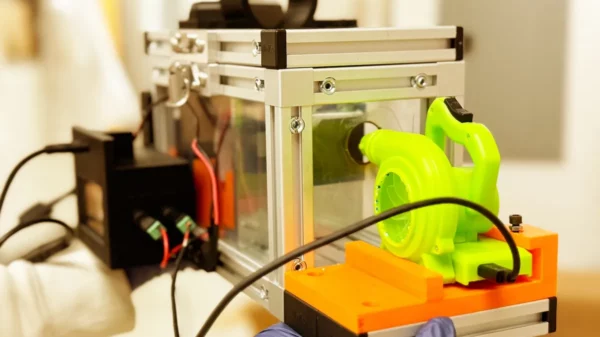While the coronavirus may halt most U.S. cannabis legalization efforts in the short term, the economic fallout will speed up reform measures next year, says a weed policy expert.
With over 700,000 confirmed COVID-19 cases in America today and counting, state legislatures are shutting down, which leaves cannabis bills either scrapped or on the brink.
As for cannabis ballot initiatives, the crisis has left advocacy groups struggling to collect enough signatures before state deadlines ahead of the 2020 election.

Chris Lindsey of the Marijuana Policy Project. Photo by Tommy Martino
“But I think we’ll see more states looking at legalization as an option than ever before in 2021 because of the budget shortfalls related to COVID,” said Chris Lindsey, director of government relations with the Marijuana Policy Project.
Hunkered down at his Montana home, Lindsey told Mugglehead the pandemic could permanently loosen how the U.S. government treats cannabis moving forward.
With 33 states permitting medical weed, he said legalization has already become less controversial in the U.S.
The fact that the majority of the states with legal cannabis have deemed weed businesses essential has set a new precedent, Lindsey said. “It’s historic.”
Read more: Major retailers keep doors open as US lawmakers deem cannabis ‘essential’
Wondering what marijuana-measures have been implemented in your state during the COVID-19 crisis? We're keeping track. Check out our guide to see what actions have been taken across the country.https://t.co/rHD7Yl2qR5
— Marijuana Policy Project (@MarijuanaPolicy) April 12, 2020
State legislatures and cannabis bills on hiatus
For now, most state legislative sessions — which ordinarily wrap up by early summer — have been suspended as governments pivot their time and resources towards tackling the coronavirus, he explains.
One of the only states that has an outside chance of legalizing recreational cannabis in 2020 is Connecticut, the former defense attorney said.
While Connecticut’s governor sponsored a cannabis bill for the first time, the state’s legislative session is currently disrupted. Lindsey, however, said there’s a chance the bill could get passed during a special session later this year.
Lindsey, who’s been with the MPP since 2013, said Vermont faces another unique situation. While the state has legalized possession and cultivation for adults, it doesn’t permit sales yet. But the state Senate and House have both passed a bill for a legal weed market, and all it needs is a committee put the final touches on that bill — which Lindsey said is likely.
“For the most part though, we’re seeing situations like in Alabama and Kentucky, where measures to legalize medical marijuana were advancing, but they’re just simply not going to advance,” he said.

Cannabis consumers gather outside a Cresco Labs Illinois dispensary after the state opened up its legal adult-use market on Jan. 1, 2020. Press photo
Cannabis revenue gets more enticing
Lindsey said prohibition states have likely already been noticing Illinois and its new legal recreational weed market.
In just the first three months of 2020, the state has racked up US$110 million in sales, despite reported supply shortages. Lawmakers will be paying even closer attention while looking at economic recovery options.
Figures published by DataTrek Research last month show that the state of New York, the U.S. epicenter for COVID-19 cases, will likely see a US$4 billion to US$7 billion revenue drop.
“There’s a simple and effective solution for states and cities to help cover their huge budget shortfalls after the COVID-19 pandemic subsides: Legalize recreational sales of marijuana,” the report reads.
DataTrek estimates if Colorado can fill its coffers with more than US$300 million in cannabis revenue, then New York could earn over US$1 billion so long as the state reasonably taxes and regulates adult-use sales.
Despite Gov. Andrew Cuomo vowing to legalize this year, Lindsey says, New York will likely have to wait until 2021 to get a bill through. And there’s a good chance the current session will also remain on hiatus for the rest of 2020.

San Francisco-based weed retailer Cookies was founded in 2012 by Berner, a Bay Area rapper, and his partner Jigga, local cultivator and breeder. California was the first state to introduce a medical cannabis law in 1996 via a ballot initiative. Press photo
Three ballot initiatives will pass in 2020, expert says
Most states need to legalize cannabis through the legislature, Lindsey explains.
But 23 states allow citizen-initiated ballot initiatives, which has been the most common path towards legalization in America.
The three states that have gathered enough signatures to get cannabis ballots approved in the November election are New Jersey, South Dakota and Mississippi.
New Jersey, with it’s nine million residents, will ask voters if they want to legalize weed for adults 21 and older. Meanwhile, Mississippi voters will vote on a state-run medical cannabis program, and South Dakota is the first state to introduce both recreational and medical initiatives on the same ballot, Lindsey said.
All states have enough signatures to qualify, and the MPP expects that voters will stay supportive on Nov. 3, he said.
Two-thirds of Americans support cannabis legalization, according to a recent Pew Research Center survey.
But in states like Missouri and Montana, where not enough signatures had been collected, Lindsey said COVID-19 is the final nail for those ballot initiatives.
“They would remain very much viable options in the 2022 election,” he said.
Other key states like Florida and Ohio had their initiatives fall apart before the pandemic broke out, according to the MPP.

Former U.S. Vice President Joe Biden has been lukewarm on cannabis legalization, but MPP wants Sen. Bernie Sanders to change the 2020 nominee’s outlook. President Donald Trump has said cannabis legality should be left up to the states. Deposit Photos
Advocates hope Bernie talks Biden into weed reform
As for the 2020 federal election itself, the MPP never endorses U.S. candidates, Lindsey says. But the cannabis reform organization appreciates Vermont Sen. Bernie Sanders position on legalization.
“He was very much taking kind of a leadership role in in being very outspoken on ending the war on cannabis,” he said.
While MPP has been disappointed in Joe Biden’s voting record in support of cannabis enforcement, they are encouraged that Sanders had recently held discussions with the former Vice President on reforming weed laws.
“We’re certainly hoping that Biden will really catch up with the majority of Americans. I mean, you have to consider that cannabis is more popular than most politicians in the United States,” Lindsey said.
For the 16-year medical cannabis user, it’s time to stop hemorrhaging money trying to enforce laws that nobody wants at either the state or federal level.
“It’s time for governments to look at the opportunity here that’s kind of staring you in the face, frankly,” Lindsey said.
Top image of Vermont State House in Montpelier, Vermont, U.S. via Deposit Photos
jared@mugglehead.com
@JaredGnam














